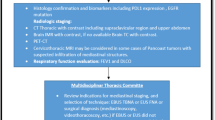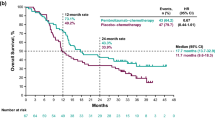Abstract
Our aim was to evaluate the prognostic role of the pretreatment serum albumin level in patients with malignant pleural mesothelioma (MPM) receiving platinum-based systemic chemotherapy. From 1995 to 2013, a total of 97 patients receiving platinum-based systemic chemotherapy for newly diagnosed MPM were enrolled. All clinical information and laboratory results were retrospectively collected from the medical records. The Kaplan–Meier method was used to calculate survival. The Cox proportional hazards model was used to identify significant independent prognostic factors for predicting survival. In total, 34 of the 97 patients (35.1 %) had hypoalbuminaemia (albumin ≤35 g/l). The 1-year overall survival rate was 44.1 % for patients with hypoalbuminaemia and 72.0 % for patients with a normal albumin level. Multivariate analysis indicated that pretreatment albumin was an independent prognostic factor in MPM. Patients with hypoalbuminaemia had a greater risk of death than those with a normal albumin level [hazard ratio (HR) 1.778; 95 % confidence interval (CI) 1.504–2.998; P = 0.031]. When albumin was entered as a continuous variable in the Cox regression model, the HR of death was significantly decreased by 9.8 % (95 % CI 0.851–0.956) for each 1-g/l increment. The pretreatment serum albumin level is a simple, inexpensive and easily measurable marker with prognostic significance in MPM patients treated with platinum-based systemic chemotherapy.

Similar content being viewed by others
References
Wagner JC, Sleggs CA, Marchand P. Diffuse pleural mesothelioma and asbestos exposure in the North Western Cape Province. Br J Ind Med. 1960;17:260–71.
Favoni RE, Florio T. Combined chemotherapy with cytotoxic and targeted compounds for the management of human malignant pleural mesothelioma. Trends Pharmacol Sci. 2011;32:463–79.
Dogan AU, Baris YI, Dogan M, Emri S, Steele I, Elmishad AG, et al. Genetic predisposition to fiber carcinogenesis causes a mesothelioma epidemic in Turkey. Cancer Res. 2006;66:5063–8.
Caraceni P, Domenicali M, Tovoli A, Napoli L, Ricci CS, Tufoni M, et al. Clinical indications for the albumin use: still a controversial issue. Eur J Intern Med. 2013;24:721–8.
Uthamalingam S, Kandala J, Daley M, Patvardhan E, Capodilupo R, Moore SA, et al. Serum albumin and mortality in acutely decompensated heart failure. Am Heart J. 2010;160:1149–55.
Onate-Ocana LF, Aiello-Crocifoglio V, Gallardo-Rincon D, Herrera-Goepfert R, Brom-Valladares R, Carrillo JF, et al. Serum albumin as a significant prognostic factor for patients with gastric carcinoma. Ann Surg Oncol. 2007;14:381–9.
Ruiz-Tovar J, Martin-Perez E, Fernandez-Contreras ME, Reguero-Callejas ME, Gamallo-Amat C. Impact of preoperative levels of hemoglobin and albumin on the survival of pancreatic carcinoma. Rev Esp Enferm Dig. 2010;102:631–6.
Wang CY, Hsieh MJ, Chiu YC, Li SH, Huang HW, Fang FM, et al. Higher serum C-reactive protein concentration and hypoalbuminemia are poor prognostic indicators in patients with esophageal cancer undergoing radiotherapy. Radiother Oncol. 2009;92:270–5.
Lambert JW, Ingham M, Gibbs BB, Given RW, Lance RS, Riggs SB. Using preoperative albumin levels as a surrogate marker for outcomes after radical cystectomy for bladder cancer. Urology. 2013;81:587–92.
Li G, Gao J, Liu ZG, Tao YL, Xu BQ, Tu ZW, et al. Influence of pretreatment ideal body weight percentile and albumin on prognosis of nasopharyngeal carcinoma: long-term outcomes of 512 patients from a single institution. Head Neck. 2013. doi:10.1002/hed.23357.
Espinosa E, Feliu J, Zamora P, Gonzalez Baron M, Sanchez JJ, Ordonez A, et al. Serum albumin and other prognostic factors related to response and survival in patients with advanced non-small cell lung cancer. Lung Cancer. 1995;12:67–76.
Villena Garrido V, Lopez Encuentra A, Echave-Sustaeta J, Alvarez Martinez C, Rey Terron L, Sotelo MT. Ballestin C [Pleural mesothelioma: experience with 62 cases in 9 years]. Arch Bronconeumol. 2004;40:203–8.
Travis WD, Brambilla E, Muller-hermelink HK, Harris CC. World Health Organization classification of tumors. Pathology & genetics. Tumors of the lung, pleura, thymas and heart. ed. IARC: Lyon; 2004.
Rusch VW. A proposed new international TNM staging system for malignant pleural mesothelioma. From the International Mesothelioma Interest Group. Chest. 1995;108:1122–8.
Morgan TM, Tang D, Stratton KL, Barocas DA, Anderson CB, Gregg JR, et al. Preoperative nutritional status is an important predictor of survival in patients undergoing surgery for renal cell carcinoma. Eur Urol. 2011;59:923–8.
Pan H, Cai S, Ji J, Jiang Z, Liang H, Lin F, et al. The impact of nutritional status, nutritional risk, and nutritional treatment on clinical outcome of 2248 hospitalized cancer patients: a multi-center, prospective cohort study in Chinese teaching hospitals. Nutr Cancer. 2013;65:62–70.
Gupta D, Lammersfeld CA, Vashi PG, Burrows J, Lis CG, Grutsch JF. Prognostic significance of subjective global assessment (SGA) in advanced colorectal cancer. Eur J Clin Nutr. 2005;59:35–40.
Tsai AC, Hsu WC, Chan SC, Chang TL. Usefulness of the mini nutritional assessment in predicting the nutritional status of patients with liver cancer in Taiwan. Nutr Cancer. 2011;63:334–41.
Gupta D, Lammersfeld CA, Burrows JL, Dahlk SL, Vashi PG, Grutsch JF, et al. Bioelectrical impedance phase angle in clinical practice: implications for prognosis in advanced colorectal cancer. Am J Clin Nutr. 2004;80:1634–8.
Jeejeebhoy KN. Nutritional assessment. Nutrition. 2000;16:585–90.
Delmore G. Assessment of nutritional status in cancer patients: widely neglected? Support Care Cancer. 1997;5:376–80.
Boles JM, Garre MA, Youinou PY. Simple assessment of the nutritional status in the critically ill patient. Resuscitation. 1984;11:233–41.
Andreoli A, De Lorenzo A, Cadeddu F, Iacopino L, Grande M. New trends in nutritional status assessment of cancer patients. Eur Rev Med Pharmacol Sci. 2011;15:469–80.
Read JA, Crockett N, Volker DH, MacLennan P, Choy ST, Beale P, et al. Nutritional assessment in cancer: comparing the Mini-Nutritional Assessment (MNA) with the scored Patient-Generated Subjective Global Assessment (PGSGA). Nutr Cancer. 2005;53:51–6.
Kato TS, Cheema FH, Yang J, Kawano Y, Takayama H, Naka Y, et al. Preoperative serum albumin levels predict 1-year postoperative survival of patients undergoing heart transplantation. Circ Heart Fail. 2013;6:785–91.
Yang SW, Choi JY, Kwon OJ. The impact of pretransplantation serum albumin levels on long-term renal graft outcomes. Transplant Proc. 2013;45:1379–82.
Su W, An T, Zhou Q, Huang Y, Zhang J, Zhang Y, et al. Serum albumin is a useful prognostic indicator and adds important information to nt-probnp in a Chinese cohort of heart failure. Clin Biochem. 2012;45:561–5.
Menon V, Greene T, Wang X, Pereira AA, Marcovina SM, Beck GJ, et al. C-reactive protein and albumin as predictors of all-cause and cardiovascular mortality in chronic kidney disease. Kidney Int. 2005;68:766–72.
Okamura K, Nagata N, Wakamatsu K, Yonemoto K, Ikegame S, Kajiki A, et al. Hypoalbuminemia and lymphocytopenia are predictive risk factors for in-hospital mortality in patients with tuberculosis. Intern Med. 2013;52:439–44.
Lee JH, Kim J, Kim K, Jo YH, Rhee J, Kim TY, et al. Albumin and C-reactive protein have prognostic significance in patients with community-acquired pneumonia. J Crit Care. 2011;26:287–94.
Lu HJ, Chen KW, Tzeng CH, Liu JH, Chiou TJ, Yen CC, et al. Evaluation of prognosis for carcinoma of unknown origin in elderly patients. Oncology. 2012;83:24–30.
Leung EY, Scott HR, McMillan DC. Clinical utility of the pretreatment Glasgow prognostic score in patients with advanced inoperable non-small cell lung cancer. J Thorac Oncol. 2012;7:655–62.
Kubota T, Hiki N, Nunobe S, Kumagai K, Aikou S, Watanabe R, et al. Significance of the inflammation-based Glasgow prognostic score for short- and long-term outcomes after curative resection of gastric cancer. J Gastrointest Surg. 2012;16:2037–44.
Kinoshita A, Onoda H, Imai N, Iwaku A, Oishi M, Tanaka K, et al. The Glasgow Prognostic Score, an inflammation based prognostic score, predicts survival in patients with hepatocellular carcinoma. BMC Cancer. 2013;13:52.
Vashist YK, Loos J, Dedow J, Tachezy M, Uzunoglu G, Kutup A, et al. Glasgow prognostic score is a predictor of perioperative and long-term outcome in patients with only surgically treated esophageal cancer. Ann Surg Oncol. 2011;18:1130–8.
Migita K, Takayama T, Saeki K, Matsumoto S, Wakatsuki K, Enomoto K, et al. The prognostic nutritional index predicts long-term outcomes of gastric cancer patients independent of tumor stage. Ann Surg Oncol. 2013;20:2647–54.
Kanda M, Fujii T, Kodera Y, Nagai S, Takeda S, Nakao A. Nutritional predictors of postoperative outcome in pancreatic cancer. Br J Surg. 2011;98:268–74.
Pinato DJ, Mauri FA, Ramakrishnan R, Wahab L, Lloyd T, Sharma R. Inflammation-based prognostic indices in malignant pleural mesothelioma. J Thorac Oncol. 2012;7:587–94.
Yao ZH, Tian GY, Wan YY, Kang YM, Guo HS, Liu QH, et al. Prognostic nutritional index predicts outcomes of malignant pleural mesothelioma. J Cancer Res Clin Oncol. 2013;139:2117–23.
Kao SC, Vardy J, Chatfield M, Corte P, Pavlakis N, Clarke C, et al. Validation of prognostic factors in malignant pleural mesothelioma: a retrospective analysis of data from patients seeking compensation from the New South Wales Dust Diseases Board. Clin Lung Cancer. 2013;14:70–7.
Nojiri S, Gemba K, Aoe K, Kato K, Yamaguchi T, Sato T, et al. Survival and prognostic factors in malignant pleural mesothelioma: a retrospective study of 314 patients in the west part of Japan. Jpn J Clin Oncol. 2011;41:32–9.
Edwards JG, Abrams KR, Leverment JN, Spyt TJ, Waller DA, O'Byrne KJ. Prognostic factors for malignant mesothelioma in 142 patients: validation of CALGB and EORTC prognostic scoring systems. Thorax. 2000;55:731–5.
Flores RM, Zakowski M, Venkatraman E, Krug L, Rosenzweig K, Dycoco J, et al. Prognostic factors in the treatment of malignant pleural mesothelioma at a large tertiary referral center. J Thorac Oncol. 2007;2:957–65.
Kucukoner M, Ali Kaplan M, Inal A, Urakci Z, Abakay O, Cetin Tanrikulu A, et al. Clinical characteristics, treatment and survival outcomes in malignant pleural mesothelioma: an institutional experience in Turkey. J BUON. 2014;19:164–70.
Acknowledgments
We thank the staff at the Department of Respiratory Medicine of Qilu Hospital and of Shandong Provincial Hospital Affiliated to Shandong University as well as the staff at the Department of Tuberculosis Medicine of Shandong Provincial Chest Hospital for their assistance in collecting clinical data.
Conflicts of interest
None.
Author information
Authors and Affiliations
Corresponding author
Rights and permissions
About this article
Cite this article
Yao, ZH., Tian, GY., Yang, SX. et al. Serum albumin as a significant prognostic factor in patients with malignant pleural mesothelioma. Tumor Biol. 35, 6839–6845 (2014). https://doi.org/10.1007/s13277-014-1938-5
Received:
Accepted:
Published:
Issue Date:
DOI: https://doi.org/10.1007/s13277-014-1938-5




